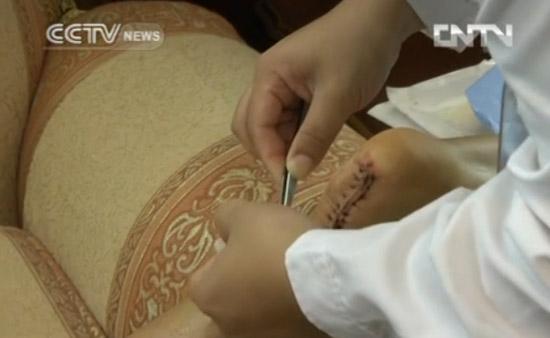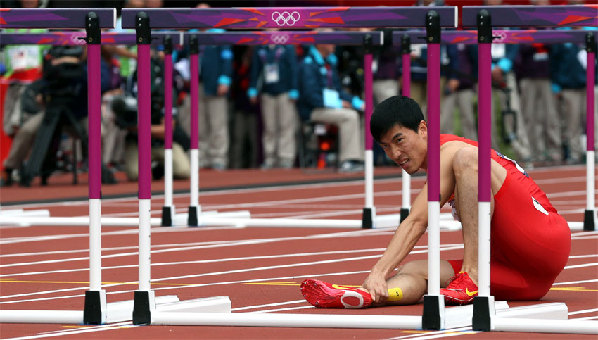Liu's fall legit - he has scars to prove it
 0 Comment(s)
0 Comment(s) Print
Print E-mail China Daily, August 25, 2012
E-mail China Daily, August 25, 2012
Chinese hurdler Liu Xiang said everything that happened on the track at the London Olympics was just as it appeared, speaking in an interview with China Central Television in Shanghai on Thursday.
|
Liu Xiang looks on after crashing at the first barrier in the 110m hurdles heats at the London Olympic Games on August 7, 2012. [Xinhua] |
Liu ruptured his right Achilles tendon when he collided with the first hurdle in the first round of the men's 110m hurdles heats. The 29-year-old then underwent surgery, receiving 13 stitches at the Wellington Hospital in London.
Liu underwent a postoperative cleaning at Shanghai Huashan Hospital on Thursday morning, and showed his 20-centimeter wound to the camera. The hurdler was speaking to the media for the first time since the injury.
It's been speculated by some in the Chinese media that the 2004 Athens Olympic champion, who was also forced to withdraw from the heats at the Beijing Games with a similar injury, deliberately fell in the race.
 |
|
Liu reveals a 20cm long scar, four times longer than that of his first operation four years ago. It will take him at least six months before he can walk normally again. [CNTV] |
Liu denied it.
"I hadn't expected that," he said. "I felt I was very healthy and in good form when I stood on the track, though there were already some problems with my foot at the time. I even felt I could be faster than I expected at the moment I started, until I tried to cross the first hurdle. It felt like someone was strapped on my back, and I stumbled.
"I have no idea why things turned out like this. I just felt a lot of pain and found a part of my foot was sunken. I was scared and I knew it must be problem with the Achilles tendon."
Liu hopped back to the athletes' entrance after he got up. He talked to a staff member, then returned to the track, hopped to the finish and kissed the final hurdle.
"To be honest, I don't know what I was thinking at that moment," he said. "I saw a staff member pushing out a wheelchair, but I told myself I can't sit on it, I still have one leg, and I hopped to finishing line.
"When I passed the last hurdle, it was in my mind to kiss the hurdle, because I had regarded the London Games as my last Olympics as an athlete, and I was a little reluctant. Though it was cruel, I jumped to the end. I thought that was a farewell to my Olympics."
Liu told CCTV he had felt uncomfortable with his foot before the Games due to his intensive training, but chose to hang on because he was afraid he would fall out of shape if he rested it.
Liu denied that his new technique, in which he takes seven steps to the first hurdle instead of his customary eight, led to the injury.
"Definitely not. I would hardly be able to run in under 13 seconds anymore if I hadn't changed to seven steps. All my training statistics this year, including speed and strength, were my best ever. I am a beneficiary of the technique," said Liu, who began doing upper-body exercises after returning to Shanghai in hopes of an early recovery.
Liu apologized to his supporters and said he doesn't regret the work he put in fighting through his injuries to get back on the track.
"I have no regrets, the result is just the result and I enjoyed the process a lot," Liu said. "The four years after the Beijing Olympics were very significant to me. I took part in many competitions. I tried the new technique and improved my result from 13.27 second to 12.87, so there are no regrets for me.
"From the bottom of my heart, I want to say sorry to those who support me. But the past is passed. I have to look ahead and I believe my future will be better.
"I am the real Liu Xiang and I can stand up to the test of time."







Go to Forum >>0 Comment(s)